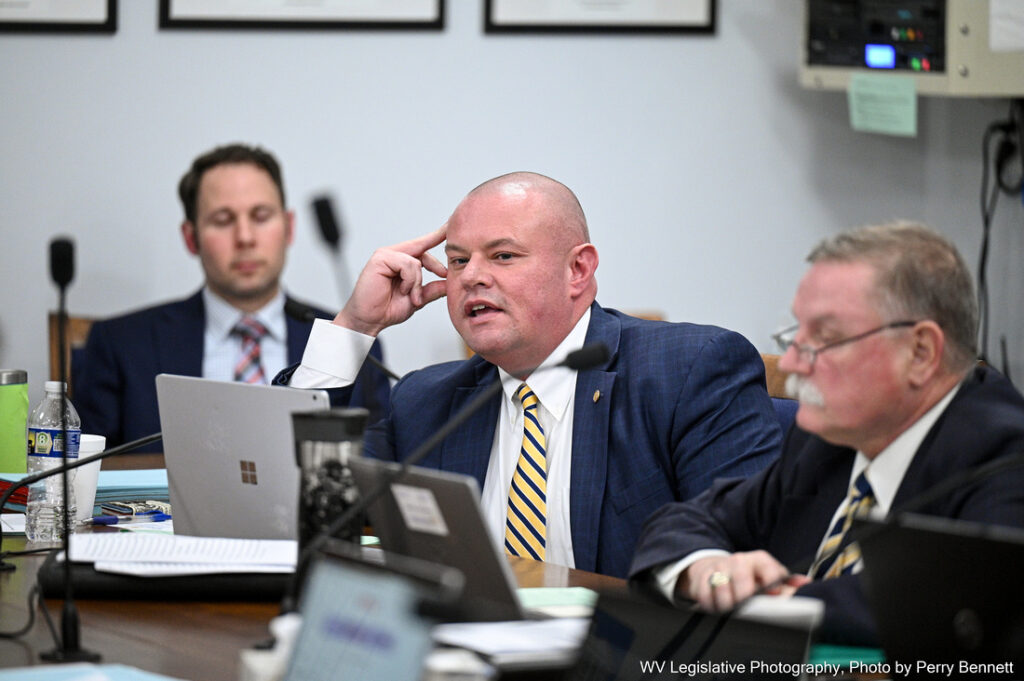A bill that would raise penalties for indecent exposure moved swiftly through the West Virginia Senate last month, passing the chamber just two days into this year’s legislative session.
But a West Virginia House of Delegates committee reviewed the bill this week with less certainty than their colleagues across the rotunda.
Senate Bill 160 would allow for stiffer penalties for individuals repeatedly convicted for “indecent exposure for purposes of sexual gratification,” permitting them to be both fined and imprisoned.
The bill prompted more than an hour of debate in the House Judiciary Committee Thursday morning.
Members of the committee widely supported reinforced protections against sexual misconduct.
But Del. Chris Pritt, R-Kanawha, sought to amend the bill to expand definitions of — and penalties for — indecent exposure when a minor was knowingly present.
Pritt said his amendment aimed to address “news across the country” of “sexually explicit” conduct in libraries and schools.
“We’re talking about shows in which individuals are dancing in a manner that is sexually suggestive in front of children at libraries, at schools,” he said. “We’ve all heard about it in the news.”
Pritt did not cite any specific examples of these performances.
Several committee members applauded Pritt’s impulse to reinforce protections for minors, but some expressed concern that his amendment would modify case law cemented in West Virginia courtrooms.
“If we’re applying a different standard than what has historically been applied, we would basically be getting rid of 100 years of case law by switching this,” said Del. Brandon Steele, R-Raleigh, who is an attorney.
The amendment would have changed the bill’s language to include references to “private parts,” defined later in the amendment to encompass body parts such as the “post-puberty female breasts with less than fully opaque covering of any part of the nipple.”
It also specified a wide range of “sexually explicit” acts that would fall into the purview of the new bill, like the “lascivious exhibit of simulated sexual intercourse.”
But opponents said these changes were too far-reaching, and gave too much authority to an individual’s definitions of nudity and sexual conduct.
They worried incidents of sexual dancing at a wedding or wardrobe malfunctions at a beach could fall into the definition of indecent exposure under the amendment.
“This is just getting worse and worse and worse. We are in a hole so deep we need a bigger shovel,” said Del. Rick Hillenbrand, R-Hampshire. “I don’t like the amendment to the amendment, [and] I don’t like the amendment.”
Ultimately, Pritt’s proposal was defeated in a vote of 11 to 11, with 3 members of the committee absent or not voting.
Still, the initial bill itself raised further concerns from lawmakers.
The Senate bill would remove a clause explicitly stating that breastfeeding did not qualify as sexual misconduct under state law.
Committee members suggested that this was because senators felt it was an unnecessary addition to state law, because breastfeeding does not constitute an act of “sexual gratification.”
But lawmakers with legal experience, like Steele, said that removing the explicit breastfeeding exemption could be seen as an effort from lawmakers to authorize prosecution for public breastfeeding.
“I don’t want anybody looking back at this legislative intent and seeing that we removed that language,” he said. “When we cross out language like that, I can see a judge saying, ‘Well, the legislature must have intended to recriminalize this.’”
Steele proposed an additional amendment to reverse the removal of the breastfeeding clause, which passed unanimously.
After extensive debate, the committee ultimately voted in favor of the bill, sending it to the full House for further discussion.




















